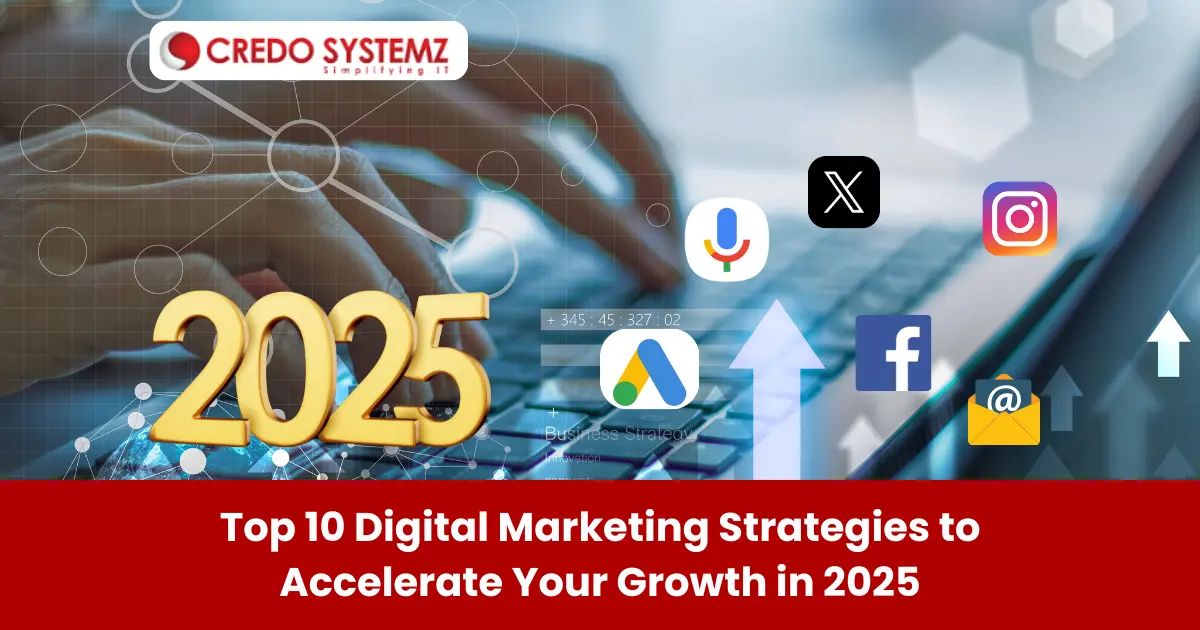
Introduction
Digital marketing continues to be a dynamic and evolving landscape, driven by new technology, changing consumer behaviors, and updated digital platforms. To stay competitive, businesses must embrace innovative and effective digital marketing strategies that prioritize personalization, data-driven insights, and adaptable content. Here are the top 10 strategies that can help accelerate growth and keep your brand relevant in the fast-paced digital environment.
Leverage AI for Personalization and Automation
AI-driven tools have become essential for automating repetitive tasks, analyzing customer data, and delivering personalized experiences. In 2025, businesses should focus on using AI to automate customer service through chatbots, improve targeting in advertising, and provide content recommendations. Leveraging AI for personalization can significantly enhance customer engagement, optimize conversions, and streamline operations.
Invest in Voice Search Optimization
As more consumers rely on voice-activated devices like Google Assistant, Alexa, and Siri, optimizing content for voice search has become crucial. By tailoring your SEO strategy for natural language queries and conversational keywords, you can capture this growing segment. Additionally, voice search requires concise and structured answers, so adjusting your content to match this format will make it easier to capture voice-search-driven traffic.
Focus on Video Marketing with a Twist
Video remains a powerful medium for engaging audiences. However, in 2025, short-form, interactive, and shoppable video content will be particularly impactful. Platforms like TikTok, YouTube Shorts, and Instagram Reels are great for creating viral content, while livestreaming on platforms like Amazon Live or Instagram Live allows brands to showcase products in real-time. Offering interactive elements, such as clickable links in videos, can turn viewers into customers faster.
Create Hyper-Personalized Email Campaigns
Email marketing remains effective, but generic campaigns are losing ground. Hyper-personalized email marketing allows brands to tailor content, offers, and product recommendations to individual customers based on their browsing history, preferences, and previous interactions. Segmenting audiences, using dynamic content, and leveraging AI for automated and personalized drip campaigns can significantly increase open rates and conversions.
Capitalize on Influencer Marketing and Micro-Influencers
Influencer marketing is evolving, with brands shifting their focus from mega-influencers to micro- and nano-influencers who have more niche and engaged audiences. These smaller influencers can drive greater engagement and authenticity, especially when they genuinely align with your brand’s values. Influencer partnerships can be a powerful tool for reaching specific demographics, building trust, and increasing brand awareness.
Optimize for Visual and Augmented Reality (AR) Search
Visual search, where users search using images instead of text, is gaining traction through tools like Google Lens and Pinterest Lens. Similarly, AR allows users to experience products virtually before purchasing them. By implementing AR features, such as virtual try-ons or 3D models of products, you can make it easier for customers to visualize themselves using your products, which can increase purchase confidence and reduce returns.
Embrace Interactive Content to Boost Engagement
Interactive content, such as polls, quizzes, surveys, calculators, and interactive infographics, helps engage users and encourages them to spend more time on your website. Such content is also more memorable and shareable, driving organic traffic and engagement. Brands that use interactive content in 2025 can improve lead generation and data collection, giving them insights into customer preferences.
Prioritize Data Privacy and Ethical Marketing
With consumers becoming increasingly aware of data privacy, brands must ensure their marketing strategies are compliant with data regulations (like GDPR) and are transparent about data use. This includes offering cookie preferences, using secure platforms, and being clear about how customer data is collected and used. By prioritizing data privacy, brands can build trust with their customers and differentiate themselves in a crowded market.
Strengthen Social Commerce Capabilities
Social commerce, or the ability to purchase directly on social media platforms, will continue to grow as platforms like Instagram, Facebook, and TikTok enhance their shopping features. Brands should consider creating product catalogs directly on social media, using shoppable posts, and collaborating with influencers to drive sales directly on these platforms. Social commerce creates a seamless shopping experience and meets consumers where they are most engaged.
Use Predictive Analytics to Inform Decision-Making
Predictive analytics helps brands anticipate future trends, customer preferences, and purchasing behaviors by analyzing past data and using machine learning. This strategy allows for data-driven decision-making, optimizing everything from inventory management to content creation. By understanding what your customers are likely to do next, you can proactively address their needs and stay ahead of competitors.
Conclusion
Finally, the most successful digital marketing strategies will center on personalization, convenience, and transparency. Brands that stay updated on the latest technology, adapt to new consumer expectations, and use data responsibly are better positioned to build lasting customer relationships. To master the digital marketing strategies, join Credo Systemz Digital marketing course in Chennai. By implementing these top digital marketing strategies, you can drive growth, enhance customer loyalty, and ensure your business stands out in an increasingly competitive landscape.
Join Credo Systemz Software Courses in Chennai at Credo Systemz OMR, Credo Systemz Velachery to kick-start or uplift your career path.
